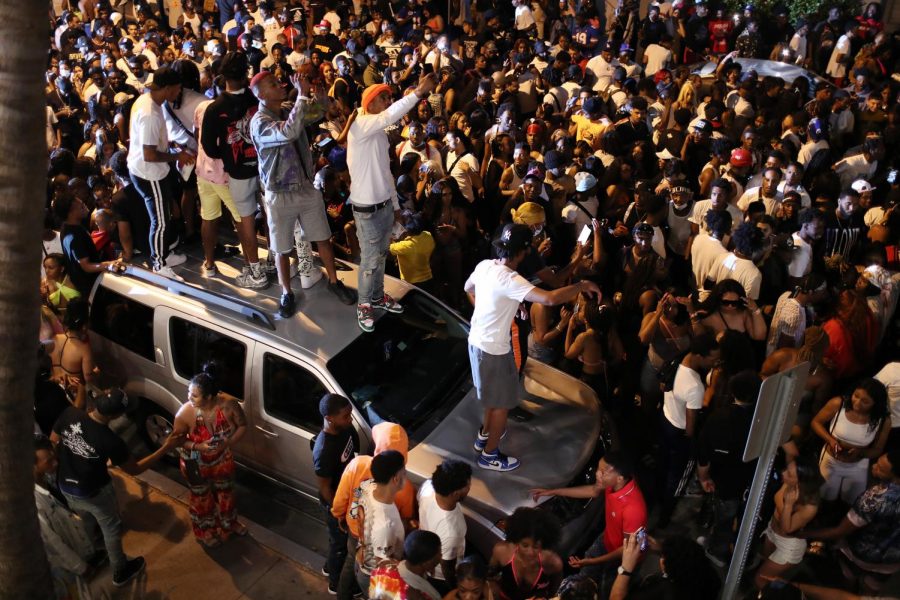Florida’s Hot Spots Report Slight Increase in COVID-19 Cases
COVID-19 cases are slightly rising in major metro areas of Florida as young people continue to flock to the state for spring break. Here, a crowd of people gathers while exiting the area as an 8pm curfew goes into effect on March 21, 2021 in Miami Beach, Florida.
March 26, 2021
Hot spots across Florida have recently witnessed a slight increase in COVID-19 cases, as flocks of young people across the country make their way to the state’s beaches and cities to celebrate their spring break.
Miami, Tampa, and Orlando are three of the metro areas who have seen COVID-19 cases rise among younger people ranging from 25 to 49 years of age, according to The Miami Herald.
This climb in cases is occurring mere months after the decline of cases in each area, with the uptick being particularly significant in Miami. The jump they experienced sent them from about 450 per day, to 550 per day over the last week. In Hillsborough Country, Tampa, cases have risen in that age group from 120 per day to 155 over the past two weeks. In Orange County, Orlando, that number has risen from about 110 to about 150 average cases in the same two-week time period.
“When we see increases like this, we know we have to pay attention,” Jason Salemi, an epidemiologist at the University of South Florida told The Miami Herald. “We know how hard it is to protect the vulnerable when there’s an increase in community transmission.”
The surge of cases could be linked to the COVID-19 restrictions affecting the state of Florida, which are much more relaxed in comparison to other states. Florida Governor Ron DeSantis was one of the first state leaders to reopen bars, restaurants and beaches at full capacity in September. Not only that, but DeSantis refused to implement a statewide mask mandate early into the pandemic, instead stating that he preferred to let city leaders decide whether to implement them locally.
Miami Beach, one of the state’s most popular spring break destinations has a mask ordinance in place, but plenty of people have been reported ignoring protocols. So far, over 1,000 arrests have been made in Miami Beach in the past week, after thousands of partygoers gathered in unruly crowds, refusing to wear face masks and defacing property. Half of the arrestees had come from out of state and included 42 felony charges and 100 confiscated guns, Miami Beach Police said.
On Tuesday, Miami Beach Mayor Dan Gelber blamed the issue on mixed messaging from DeSantis.”I don’t think we’ve done a great job statewide,” Gelber said in an interview with Fox News. “What I think we didn’t do well enough was really preach to people with one voice that they need to wear a mask and be smart … [Visitors] were not getting that here. They were getting a lot of mixed messages, and I think that hurt us.” Miami Beach responded to the issues it faced over spring break by imposing an 8 p.m. curfew in its entertainment district.
“Too many are coming, really, without the intention of following the rules, and the result has been a level of chaos and disorder that is just something more than we can endure,” Gelber told CNN.
The influx of tourism over the break also comes at a time when more than 70 percent of people age 16 or older have not yet received the COVID-19 vaccine in Florida. So far, only 24 percent of the state has received at least one dose of the vaccine, while 13.4 percent have been fully vaccinated, according to a New York Times database.
Earlier this month, DeSantis said that the state would not re-enter lockdown, even if its COVID-19 case numbers significantly worsened. “To even contemplate doing any kind of lockdown, honestly, it’s insane, so that’s not going to happen in the state of Florida,” he said on March 12. “We like the fact that people have been able to work here … so we’re going to continue doing what works, but under no circumstances would we entertain doing anything of the sort.”
As of Wednesday, Florida ranks third out of the states with the highest overall number of reported COVID-19 cases, according to the Times. Over 2 million people have contracted the virus in Florida, and 32,819 have died since the start of the pandemic.


